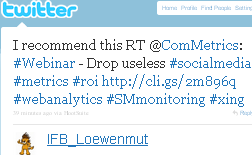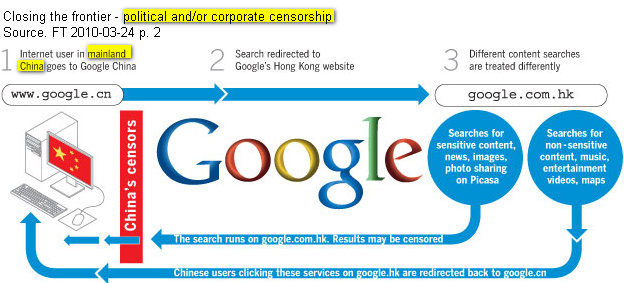What do Foster’s, Nestlé, UBS, the City of Zurich and Starbucks have in common? They are all trying to figure out whether staff spending two to three hours on Facebook, Hi5, Xing, LinkedIn, Twitter, etc. each day increases customer engagement or just wastes time.
Some are unsure and therefore blocking or controlling access to certain social media destinations:
City of Zurich blocks access to social networks
- (as have Credit Suisse & UBS).
Moreover, Google’s showdown with China’s censors highlights increasing official efforts to control the web, ranging from selective to substantial censorship.
We outline five critical questions that must be answered before blocking employee access to social networks.
1. Which SM channels does your company use?
Before blocking web access to certain destinations, you must distinguish between different types.
For instance, there are four different types of social media channels or networks, including those that:
- a) foster
collaborative work and knowledge sharin
- g (e.g., corporate blogs and/or wikis),
- b) facilitate
professional networking and information exchange
- (e.g., LinkedIn, Xing or Viadeo),
- c) provide
methods of quick information distribution
- (e.g., Twitter, Naijapulse, Identi.ca, instant messaging), and
- d) help us
stay connected with friends and family
- (e.g., Facebook, Hi5).
Some companies may encourage internal methods and versions of the above, but frown on employees contributing to them from outside the corporate network.
Hence, the challenge is to make the right choices when it comes to deciding which of the four channels employees are given access to. One thing is certain, however; if the company is very active on Facebook, it is counter-productive to block employee access to it.
2. Could legislation make things more difficult?
Besides which channel you use and which you allow your workers to access during business hours, you must also consider the local legal landscape.
For instance, regulation regarding privacy, data protection, product liability and intellectual property rights may set the stage for what can and what cannot be permitted on work computers.
Moreover, most courts follow the principle that if something has been quietly tolerated over a period of time, it is permitted. In fact, rules that are not consistently and fairly enforced cannot be used to justify later sanctions against staff.
So we need to carefully assess what it means if workers use company tools, services and work-time to access social media destinations like Viral Networkers. What are the legal implications and/or possible consequences? How can the risk of damage be minimized without cutting employees off altogether (i.e. the middle road)?
3. Could resistance be futile?
Besides having to carefully decide which networks employees may use for work and assessing how local legislation affects the equation, one must decide whether corporate resistance is a futile exercise.
For instance, the company can prevent workers from accessing these websites using company technology and services, but what they do during a break must be left to them. Using private mobile phones to surf or send out status tweets is the employee’s decision.
 The resistance versus acceptance issue may be decided for the company by its customers. For instance, if clients reach out to workers using instant messaging or writing a comment on an employee’s Facebook wall, resisting this type of connection seems outright stupid.
The resistance versus acceptance issue may be decided for the company by its customers. For instance, if clients reach out to workers using instant messaging or writing a comment on an employee’s Facebook wall, resisting this type of connection seems outright stupid.
Employees already use their mobile phones to send text messages to clients if they are delayed on the way to a meeting. No smart employer would object to an employee using the technology to inform the client. These days, it might just happen via a direct message using Twitter and an iPhone. As long as it helps the client, it should be okay, no?
4. Could greater collaboration increase know-how?
Maybe we agree that resisting the increasing pervasiveness of social media in people’s lives is futile.
Of course, the Internet can facilitate collaborative work efforts. For instance, with the help of internal networks, companies have used blogs and wikis to better share information and know-how among staff in different divisions and countries. Even participating in wikis run by an association or professional society (e.g., IEEE, ACM, APA) may help foster learning and staying up-to-date with the latest developments within a profession or industry.
But we disagree that the Internet has enhanced and improved reading, writing and the rendering of knowledge for the average Joe, as claimed by experts participating in a recent Pew study.
If you know about such work, please provide this information as a comment below – we love reading up on this.
5. What factors may influence social media usage?
Depending on market regulation and wealth, the majority of employees under the age of 40 may have a smartphone with the option of mobile Internet access (e.g., Finland, Sweden & Denmark).
Nevertheless, status updates on Twitter or Facebook from my tax assessor or neighborhood cop will not foster greater citizen engagement, will they? Nor does the crane operator or brick layer on a construction site need to provide status updates on Twitter via their iPhone. In fact, this might distract from the work and become a serious safety issue.
 However, worst is when a company fails to grasp the culture of social media in a global virtual environment. A perfect example is the viral attack launched by Greenpeace against one of Nestlé’s brands:
However, worst is when a company fails to grasp the culture of social media in a global virtual environment. A perfect example is the viral attack launched by Greenpeace against one of Nestlé’s brands:
Response needs to be such that a global audience gets the message and understands why the situation may not be as black and white as Greenpeace claims. This is difficult to achieve considering cultural factors. Nevertheless, seeing Nestlé make such a blunder of this does raise the question of whether its marketing department needs a serious shake-up to wake up.
 Take-aways – a control list that works
Take-aways – a control list that works
Here is how social media access can be managed to benefit the company, workers AND customers:
1.using social media to engage clients suggests that employees must be encouraged to reach out to clients via these channels (no, Nestlé’s Kit Kat flop against Greenpeace on Facebook does not qualify the food giant,
2.leveraging usage of these information channels at work is critical to the bottom line (e.g., how to do better while using no more than 20 minutes a day), and finally,
3. educating staff about using social media (e.g., hi5, Naijapulse or Second Life) to limit the chance of wrongful or unethical use thereof (this social media resource page helps).
More resources about social media 101 and your corporate brand:
ComMetrics – Yes Virginia, social media client-engagement IS a myth!
Bernhard Warner – Will Nestlé Ever Reclaim its Facebook Page from Protesters?
Pew Internet and American Life Project – The future of the internet IV (research report – summary – download full report)
Advertising Age – Five reasons companies should not block access to social networks
ComMetrics – Social media policy – resource page for those that work like magic
M. Bamieh – Carlton Draught Beer – Learn Social Media by Example – don’t fail to see an opportunity when you have one. Foster’s did, deciding not to air TV ads like the one below. Putting them on a special website was smart, but pulling them off the web when they started going big-time viral was plain stupid (see also 5 steps beyond viral marketing).

Bottom line
Instead of pervasive limitation or outright blockage of access, following the above hones in on using selective censorship, allowing employees the opportunity to use social media smartly for job-related purposes.
Whatever you do, benchmark your social media efforts – you can register for FREE with My.ComMetrics.com to benchmark smartly and improve performance.
Companies will be held accountable by social activists, traditional media and bloggers. As the Nestlé case illustrates, most viral marketing is at the expense of your brand (see also US Airways and the Hudson River landing).
 When this happens, it helps to have vigilant workers that know the facts and share them with their own social networks. Just laying down to take a beating is never a smart thing to do.
When this happens, it helps to have vigilant workers that know the facts and share them with their own social networks. Just laying down to take a beating is never a smart thing to do.
What is your take? Will Nestlé Waters North America learn from the Kit Kat social media debacle and use social media smarter? (See 2010-03-29 – spearheaded by Food and Water Watch – consumer groups launched campaign against Nestlé Waters North America’s proposed facility in Oregon’s Columbia River Gorge.)
This is your chance to contribute your expertise and experiences. Please share; we love dialoguing in the comments. What would you advise Greenpeace, Nestlé or Foster’s to do next time this happens?
You can get updates for this blog on Twitter by following @ComMetrics, get a free subscription by RSS, or get new posts via email:

Article source: ComMetrics – 5 reasons NOT to seal your social media borders
ComMetrics University – coffee break webinars
 Webinars are held every Wednesday at 8:45 AM CET for no more than 20 minutes – the time you spend on a coffee break. In order to make each webinar as interactive as possible, we will limit attendance to about 15 people, so please register yourself NOW, since space is limited and filled on a first-come, first-served basis.
Webinars are held every Wednesday at 8:45 AM CET for no more than 20 minutes – the time you spend on a coffee break. In order to make each webinar as interactive as possible, we will limit attendance to about 15 people, so please register yourself NOW, since space is limited and filled on a first-come, first-served basis.
Our inaugural webinar addressing issues pertaining to this blog post and others was held this morning.
Register for future webinars here:
 2010-04-07 ComMetrics University – coffee break webinar: Drop the useless social media metrics
2010-04-07 ComMetrics University – coffee break webinar: Drop the useless social media metrics
Or just leave a comment below and we will make sure that you get a personal invitation with the particulars for next week’s webinar, including presentation slides that include links to further resources and freebies.

Pingback: Urs E. Gattiker
Pingback: Derek Brown
Pingback: Sophie Zollmann
Pingback: Urs E. Gattiker
Pingback: Brett Petersel
Pingback: Urs E. Gattiker
Pingback: Digitus Marketing
Pingback: Digitus Marketing
Pingback: Lindiwe
Pingback: Boosting ROI through social media measurement » marketing metrics, social media leads, brand mentions in social media, best metrics, best practice, cost-benefit analysis, right blog metrics, » ComMetrics
Pingback: Fred Carman
Pingback: Paul
Pingback: Jane Tjon Tjauw Liem
Pingback: David Schaefer
Pingback: Chloe
Pingback: Chloe
Pingback: ComMetrics weekly review: Do mind the GAP » social media marketing, social media monitoring, Twitter monitoring, customer relationship management, usability test, best practice, checklist » Helping you benchmark smarter to increase ROI with: Social medi
Pingback: 4 things Mom forgot about social media » social media monitoring, best metrics, best practice, next practice, cost-benefit analysis, benchmark social media, marketing metrics, right blog metrics, reputation, brand management, » Helping you benchmark sma
Pingback: 2011 trends: Risk management and social media ROI » ocial media monitoring, social media marketing, Twitter monitoring, Facebook strategy, social media ROI, customer engagement, customer relationship management, » Helping you benchmark smarter to increa